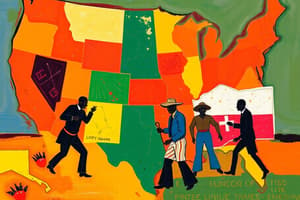Podcast
Questions and Answers
What was the main goal of the Compromise of 1850?
What was the main goal of the Compromise of 1850?
- To resolve the issue of slavery in the territories (correct)
- To end the Mexican-American War
- To extend the Missouri Compromise line
- To create a more representative government
What was the result of the Wilmot Proviso?
What was the result of the Wilmot Proviso?
- It banned slavery in newly acquired lands. (correct)
- It extended the Missouri Compromise line
- It ended the Mexican-American War.
- It created a more representative government.
What was the outcome of the House's resolution in the 1850 speaker dispute?
What was the outcome of the House's resolution in the 1850 speaker dispute?
- Howell Cobb was elected on the 63rd ballot. (correct)
- Slavery was abolished in the Mexican Cession.
- The Wilmot Proviso was passed
- The Missouri Compromise was extended
What was the main issue in the Civil War?
What was the main issue in the Civil War?
What was the result of the Constitutional Convention in 1849?
What was the result of the Constitutional Convention in 1849?
Flashcards are hidden until you start studying
Study Notes
-
The Compromise of 1850 was a package of five separate bills passed by the United States Congress in September 1850 that defused a political confrontation between slave and free states on the status of territories acquired in the Mexican-American War.
-
The compromise was designed by Whig senator Henry Clay and Democratic senator Stephen A. Douglas, with the support of President Millard Fillmore.
-
The component acts of the compromise were: the admission of California as a free state, the assumption of Texas's public debt, the organization of New Mexico Territory and Utah Territory, and the passage of a more stringent Fugitive Slave Law.
-
The issue of slavery in the territories would be re-opened by the Kansas-Nebraska Act, but the Compromise of 1850 played a major role in postponing the American Civil War.
-
The Compromise of 1850 was a deal between the United States and Mexico that settled the issue of slavery in newly acquired territories.
-
The Wilmot Proviso, an amendment to the US Constitution, was a proposal that would have banned slavery in any newly acquired lands.
-
The Treaty of Guadalupe Hidalgo, which was signed after the Wilmot Proviso was defeated in the Senate, transferred ownership of Alta California and New Mexico to the United States.
-
The Missouri Compromise had settled the issue of the geographic reach of slavery within the Louisiana Purchase territories by prohibiting slavery in states north of 36°30′ latitude.
-
Polk sought to extend this line into the newly acquired territory, but the issue of slavery blocked any such legislation.
-
After three weeks and 62 ballots, the House adopted a resolution that allowed a speaker to be elected with a plurality, and elected Howell Cobb on the 63rd ballot.
-
As James McPherson puts it: "It was an inauspicious start to the 1850's."
-
The Mexican-American War ended in 1848 with the annexation of Texas by the United States.
-
The Treaty of Guadalupe Hidalgo did not mention the claims of the Republic of Texas; Mexico simply agreed to a border south of both the Mexican Cession and the Republic of Texas claims.
-
After the end of the Mexican-American War, Texas continued to claim a large stretch of disputed land that it had never effectively controlled in present-day eastern New Mexico.
-
New Mexico had long prohibited slavery, a fact that affected the debate over its territorial status, but many New Mexican leaders opposed joining Texas primarily because Texas's capital lay hundreds of miles away.
-
The issue of whether it would be free or slave might well have gone undecided for years, as it had already after the end of the Mexican American war, if not for the finding of natural riches.
-
In response to growing demand for a better more representative government, a Constitutional Convention was held in 1849. The delegates unanimously outlawed slavery.
-
The issue of California would play a central role in the exhausting 1849 speaker dispute.
-
The Mexican-American War had ended in 1848, and the United States acquired the Mexican Cession, which consisted of parts of what are now California, New Mexico, and Arizona.
-
Slavery was still legal in the Mexican Cession, and Congress was divided over what to do with the territories.
-
The three titans of Congress—Henry Clay, Daniel Webster, and John C. Calhoun—were at odds over what to do.
-
Clay proposed a compromise package which combined the major issues under discussion.
-
This package was voted on by Congress, but was rejected.
-
Clay continued to work on the issue, but was eventually defeated.
-
The issue of slavery in the Mexican Cession would become the leading issue in the Civil War.
Studying That Suits You
Use AI to generate personalized quizzes and flashcards to suit your learning preferences.




